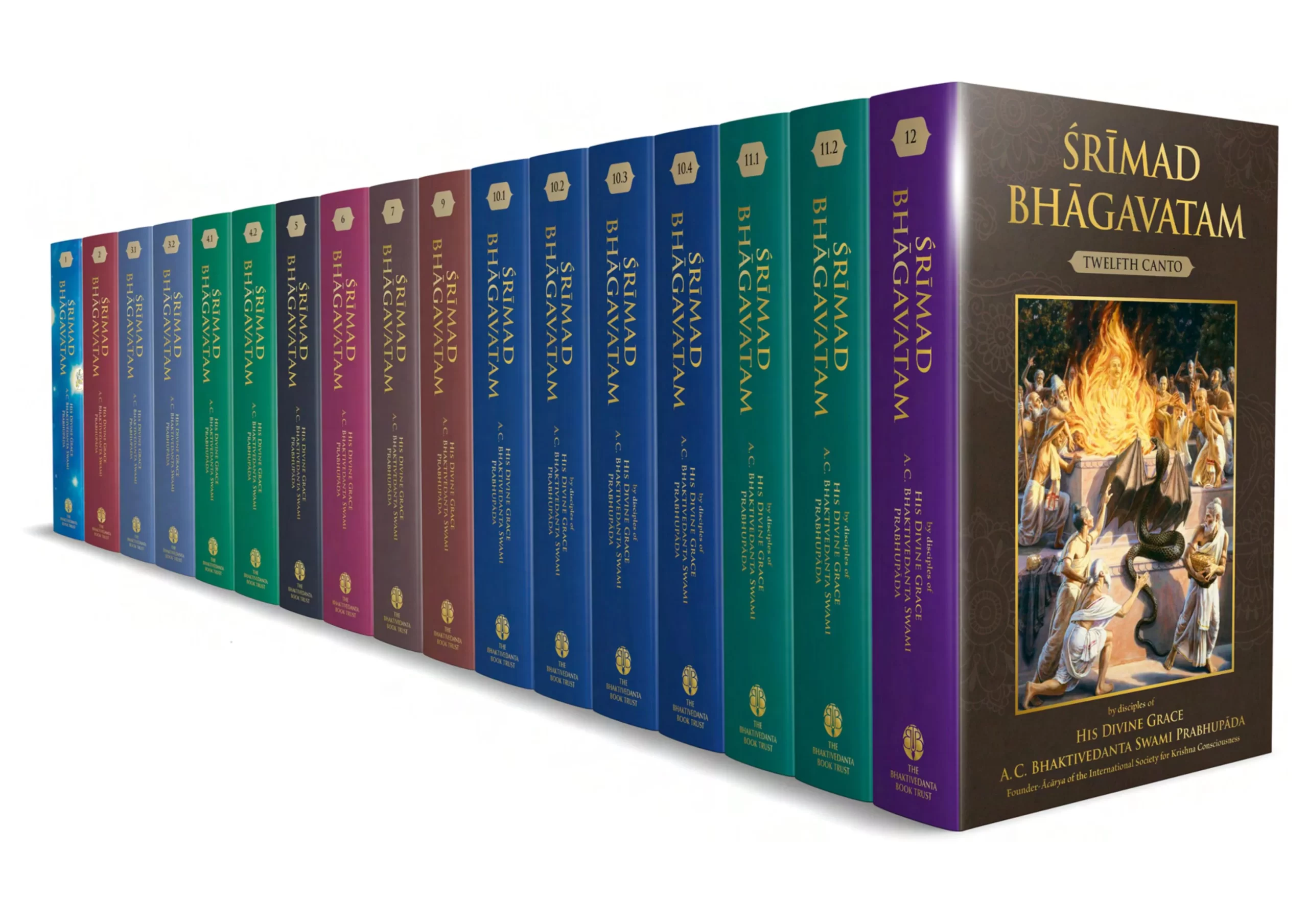
Shop
Srimad Bhagavatham (Bhāgavata Purāṇa) – 18 Volume Set
$320.00
Srimad-Bhagavatam, an epic philosophical and literary classic, holds a prominent position in India’s voluminous written wisdom. This ancient text touches upon all fields of human knowledge. The timeless wisdom of India is expressed in the Vedas, ancient Sanskrit texts. Originally preserved through oral tradition, the Vedas were first put into writing by Srila Vyasadeva. After compiling the Vedas, Srila Vyasadeva was inspired to present their profound essence in the form of Srimad-Bhagavatam. Known as “the ripened fruit of the tree of Vedic literature, “Srimad-Bhagavatam is the most complete and authoritative exposition of Vedic knowledge – covering everything from the nature of the self to the origin of the universe.
Description
Of all the collections of spiritual teachings found in Vedic literature, Srimad-Bhagavatam is considered the topmost. Vedic literature is sometimes said to be a “desire tree,” a tree that can yield whatever one might desire, and of that tree the Srimad-Bhagavatam is said to be the ripe and most relishable fruit. Srimad-Bhagavatam is sometimes said to begin where the Bhagavad-gita leaves off, since it goes even further into the nature of reality and the relationship between all beings and the Absolute.
The Bhagavatam’s eighteen thousand verses consist of hundreds of conversations—spoken between yogis, sages, and self-realized kings of the ancient world—on how to achieve life’s ultimate perfection. Their discussions frequently center on various incarnations of Krishna—the Supreme Person—and descriptions of His pastimes with His devotees. The entire work was compiled by Vyasadeva—editor of the Vedas—as his own commentary on Vedanta-sutra, the essence of all theistic knowledge.
” The Bhagavatam is also known as the Bhagavat Purana, one of the eighteen Puranas (supplemental works) in the Vedic tradition. It is presented in twelve cantos—volumes—each of which deals with a specific aspect of the Absolute Truth, the original and supreme cause of all causes. The main theme running throughout the Bhagavatam is the science and practice of bhakti-yoga, devotional service to the Supreme Person. “
Perhaps the author himself, Srila Prabhupada, sums up the Bhagavatam best in his Preface:
“Srimad-Bhagavatam is the transcendental science not only for knowing the ultimate source of everything but also for knowing our relation with Him and our duty toward perfection of the human society on the basis of this perfect knowledge. It is powerful reading matter in the Sanskrit language, and it is now rendered into English elaborately so that simply by a careful reading one will know God perfectly well, so much so that the reader will be sufficiently educated to defend himself from the onslaught of atheists. Over and above this, the reader will be able to convert others to accepting God as a concrete principle.
“Srimad-Bhagavatam begins with the definition of the ultimate source. It is a bona fide commentary on the Vedanta-sutra by the same author, Srila Vyasadeva, and gradually it develops into nine cantos up to the highest state of God realization. The only qualification one needs to study this great book of transcendental knowledge is to proceed step by step cautiously and not jump forward haphazardly as with an ordinary book. It should be gone through chapter by chapter, one after another. The reading matter is so arranged with the original Sanskrit text, its English transliteration, synonyms, translation and purports so that one is sure to become a God-realized soul at the end of finishing the first nine cantos.
“The Tenth Canto is distinct from the first nine cantos because it deals directly with the transcendental activities of the Personality of Godhead, Sri Krsna. One will be unable to capture the effects of the Tenth Canto without going through the first nine cantos. The book is complete in twelve cantos, each independent, but it is good for all to read them in small installments one after another.”
Special Features:
* Original Sanskrit text
* English equivalents, word-for-word
* Elaborate commentary
* Opening chapter summaries in most volumes







